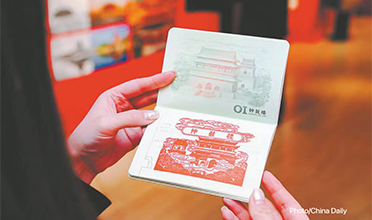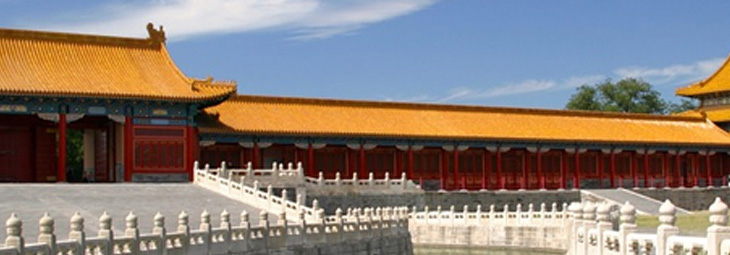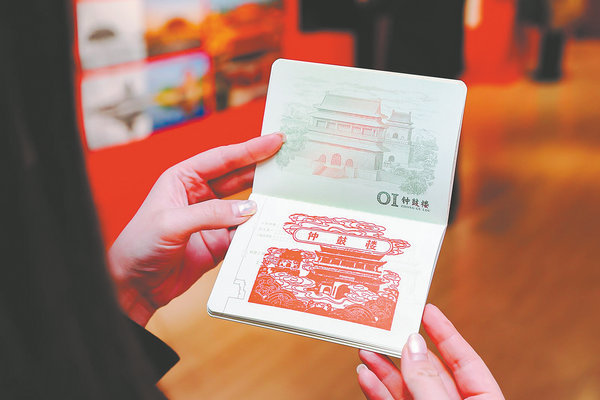



Unique stamps for these 15 sites have been designed and are included in a newly released "Beijing Central Axis passport". [Photo/China Daily]
For those who like to travel, perhaps one of the fun aspects is collecting the stamps of places they've visited in their passports. Now, the Central Axis of Beijing offers a similar experience to visitors and citizens alike, who have the opportunity to collect seal stamps in a "Beijing Central Axis passport".
Released in January, the "passport" is a booklet containing illustrations of 15 heritage sites along the Central Axis of Beijing — such as the Palace Museum, Jingshan Park, and the Temple of Heaven — the core of the capital that stretches 7.8 kilometers from south to north.
Using anti-counterfeiting measures, the pages feature hidden images that are only visible under fluorescent light.
With the recently launched series of public activities, aimed at promoting the Central Axis of Beijing through the seal carving art form, tourists will be able to collect seal stamps unique to each heritage site, which can be found at the sites, subway stations along Beijing's Line 8, the Beijing Central Axis Protection Foundation, as well as the China Millennium Monument.
Since 2019, the annual Chinese Seal Carving exhibitions have been hosted at the China Millennium Monument, highlighting a different theme each year that is complemented by supporting lectures and activities that serve to engage the broader public in the art of seal carving.
This year, with the Central Axis of Beijing as the theme, the Beijing Central Axis Protection Foundation, Beijing Gehua Cultural Development Group, China Millennium Monument's art museum and the Chinese National Academy of Arts' seal carving college all collaborated in hosting a series of public activities that promote Beijing's heritage with the seal carving art form.
Li Danyang, artistic director of Beijing Gehua Cultural Development Group, introduced the main highlights in his speech at an opening ceremony held on March 11 at the China Millennium Monument.
Three main categories have been introduced — seal carving activities tailored for children and teenagers, an exhibition showcasing seal carving works and an awards ceremony.
This May, seal carving experts and teachers will be invited to visit Beijing's primary and middle schools, as well as Children's Palace, a public facility that provides extracurricular education for teenagers and children.
In-person and online courses, where young students will be introduced to the art form and traditional Chinese art in general, will be offered. Outstanding pieces created by the students will have the opportunity to be included in an exhibition in July.

Seal carving illustrations of 15 heritage sites along the Central Axis of Beijing — such as the Palace Museum, Jingshan Park, and the Temple of Heaven — the core of the capital that stretches 7.8 kilometers from south to north. Unique stamps for these 15 sites have been designed and are included in a newly released "Beijing Central Axis passport". [Photo/China Daily]
The exhibition is the second major component in the event series, with works being contributed by the event's supporting organizations, schools and the young participants. The exhibition will debut at the China Millennium Monument, before touring heritage sites and cultural venues across Beijing.
In August, the event series will host an awards ceremony in honor of individuals and groups that have contributed to the exhibition's implementation and the promotion of the Central Axis of Beijing.
"This year's events encompass a variety of activities, including lectures on Chinese seal carving history and culture, hands-on activities related to seal carving, seal stamp collecting and subway station exhibitions, which encourage the general public to participate and promote the Central Axis of Beijing via the art form," Li says.
At the opening ceremony, 16 representatives from organizations that supported the event series marked its commencement by stamping seals onto a scroll painting depicting heritage sites along the Central Axis of Beijing.
The ceremony was also accompanied by an exhibition presenting the sites, the seals created for the sites and a variety of seal carving pieces.
"The activities center on the preservation and inheritance of the Beijing Central Axis, and use the seal carving art form to concisely, yet vividly portray its historical and contemporary stories," says Yu Ping, a counselor at the Beijing government and a former deputy director of Beijing Cultural Heritage Bureau.
"Also, the event focuses on encouraging the public to actively take part, exercise their creativity and create works that blend traditions with a modern touch, which is sure to produce many outstanding art pieces."
Source: <https://www.chinadaily.com.cn/a/202403/25/WS6600acb8a31082fc043be608.html>
Edited by Wang Yue